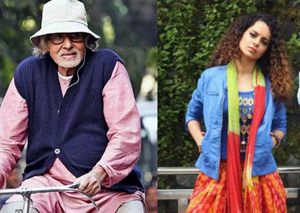New Delhi, Mar 28: Megastar Amitabh Bachchan won his fourth National award for "Piku", while it was a second consecutive best actress win for Kangana Ranaut at the National Film Awards announced here today, which saw Bollywood's dominance in major categories, barring the top prize that went to multilingual "Baahubali".
73-year-old Bachchan won the best actor honour for his turn as a hypochondriac father in the road-trip family drama. He previously won the honour for "Agneepath", "Black" and "Paa".
Ranaut, who turned 29 last week, was declared the winner for her endearing dual turn as Tanu, a troublesome wife and Haryanvi sportsperson Datto in romantic comedy "Tanu Weds Manu Returns".
The actress called it the "best birthday gift" especially since she gets to honour with Bachchan.
"It is the best birthday gift I could have got. I am thrilled and feel blessed especially since Mr Bachchan is the best actor with me," Ranaut said in a statement.
This is the third trophy for Ranaut at the National Awards, having won best actress for "Queen" last year and earlier for best supporting actress for 2008 film "Fashion".
SS Rajamouli's magnum opus "Baahubali" was announced the best feature film winner by filmmaker Ramesh Sippy, who headed a 11-member jury, even as last year's much appreciated "Masaan" had to contend itself with just a best debut director award for Neeraj Ghaywan.
"Baahubali" star Rana Daggubati said, "I am thrilled. We took a risk and attempted something different with it. Now with this award we feel honoured."
Sweeping historical romance "Bajirao Mastani", starring Ranveer Singh, Deepika Padukone and Priyanka Chopra, helped its director Sanjay Leela Bhansali win the best director honour, besides bagging five more honours.
"This is my first National award as a director, it is really very special to me. My mother always prayed that I should get one and here I get it. Her prayers are answered," Bhansali told PTI.
The director said his mother screamed with happiness when she got to know about his win.
Sharat Katariya's debut "Dum Laga Ke Haisha", a '90s set drama in Haridwar about the romance between a mismatched couple, was named the best Hindi film.
Salman Khan-starrer cross-border drama "Bajrangi Bhaijaan" was named best popular film providing wholesome entertainment.
"Thank you everybody for all your love. We are really happy that 'Bajrangi Bhaijaan' got the National Award for Best Popular Film," director Kabir Khan tweeted.
Best adapted screenplay honour went to Vishal Bhardwaj for real-life inspired crime drama "Talvar", while the best original screenplay and dialouge was shared between Juhi Chaturvedi (Piku) and Himanshu Sharma (Tanu Weds Manu Returns).
"Nanak Shah Fakir" won the Nargis Dutt award for best feature film on National integration, besides winning best costume honour.
Actress Kalki Koechlin's stint as a girl affected with cerebral palsy in Shonali Bose's "Margarita with a Straw" got a special jury mention.
"Bajirao Mastani" also earned Tanvi Azmi the best supporting actress honour for her portrayal of a shrewd mother, while Remo D'Souza got his first National Award for choreographing two chart topping numbers "Pinga" and "Deewani Mastani".
The period drama also won majorly in technical categories like cinematography, production design, re-recordist and sound design, thereby becoming the biggest gainer at the ceremony with six trophies.
Tamil star Samuthirakani bagged the best supporting actor award for his role in thriller, "Visaranai", based on M Chandrakumar's novel "Lock Up". The movie also won the best Tamil film and best editing awards.
Dum Laga Ke Haisha's popular soft melody "Moh Moh ke Dhaage" earned two honours for its female singer Monali Thakur and lyricist Varun Grover.
Whereas, Mahesh Kale took home the best playback singer (male) award for crooning in Marathi film "Katyar Kaljat Ghusali".
"Baahubali", which won best feature film honour, also scored the best special effects award for CGI-laden screenplay.
Resul Pookutty's co-production "Nanak Shah Fakir", based on the life and teachings of the first Sikh guru, Guru Nanak Dev, won the Nargis Dutt Award for best feature film on national integration, besides best costume design and make-up.
"Valiya Chirakulla Pakshikal", a dramatically disturbing exposition of the ill effects of pesticides in North Kerala, bagged the best film on environmental conservation/[preservation.
Story of a child prodigy "Duronto" won best children's film, while actor Gaurav Menon took home the best child artist award for his performance in "Ben".
"Nirnayakam" was named the best film on social issues.
Meghna Gulzar's "Talvar" also bagged the best location sound recordist honour. The best song award went to "Kaathirun Nu Kaathirunnu" from "Ennu Ninte Moideen", while ace composer Ilaiyaraaja won the best background score honour for "Thaarai Thappattai".
Bhaskar Hazarika's "Kothanodi" won the best Assamese film award, while veteran filmmaker Gautam Ghose's evocative story "Shankhachil" took home the trophy for the best Bengali movie.





Comments
Add new comment